- Home
- Captain W E Johns
51 Biggles Foreign Legionaire Page 9
51 Biggles Foreign Legionaire Read online
Page 9
The reason for the murder remains a mystery. Investigations are proceeding. Meanwhile the death of a man so well known in big financial circles is likely to have a sharp effect on world stock markets."
Ginger handed the paper back to Biggles without a word, but with his eyes conveyed that he understood.
Klutz sat still in his seat, staring at the ground in front of him.
Up to the time the departure of the east-bound plane was announced over the loud-speakers it seemed that they were to be the only passengers.
They assumed that Klutz was going. But at the last moment, looking a trifle hot and bothered, in walked Algy and Bertie. Ginger smiled lugubriously. He would have said that Bertie needed no make-up to make him look like an English tourist, but with monocle in eye, camera over
'shoulder and a well-labelled valise in his hand, he was the continental caricature of one.
"By Jove, old boy, we jolly nearly missed the old bus that time." he told Algy loudly as they hurried to the
86
booking office. Looking over his shoulder at Biggles and Ginger he went on : "I say, you fellers, just see that beastly plane doesn't go without us."
Even Klutz half-smiled at this exhibition of British tourism as he got up and went out to where the machine was waiting, engines idling. Biggles and Ginger followed. As they took their seats Algy and Bertie were shown to theirs by the stewardess. There were no other passengers. The door was closed. The engines bellowed, and leaving a cloud of dust swirling behind it the east-bound plane swept into a sky unbroken by cloud.
To Ginger there was something unreal about the long flight that followed.
For the first time they were all in the same plane without being able to speak to each other; for Biggles had, by a warning frown in the direction of Klutz, indicated the position, although, as they too had seen the Air-Commodore's photographs, there was reason to hope that they also had recognized him. Bettie did a lot of talking to Algy, all of an inconsequential nature, but the three parties kept to themselves. Klutz had sunk into his seat, busy with thoughts which, judging from his expression, were not of the brightest.
During the hilt at Tripoli to refuel Algy and Bertie got out, as they said, to stretch their legs. This was the chance for which Biggles had waited, and Biggles and Ginger followed hoping to get in a word. But Klutz, too, got out, and was never out of earshot, although this. Biggles was sure, was entirely fortuitous, for he couldn't have suspected anything.
Algy and Bertie must have been as disappointed as Biggles at this frustration. Algy made a business of checking the time and entering it in his notebook as if he were keeping a log of the trip. Biggles, knowing he couldn't be serious about this, guessed the purpose, and took care to follow him up the steps in the machine when the time came for departure.
Ginger put himself between Biggles and Klutz, who therefore did not see the slip of paper pass from Algy to Biggles.
87
Not until they were in the air did Biggles read the message, and then he did so under cover of his newspaper, holding it so that Ginger, in the next seat, could see it too.
All Algy had written was: "All as planned. Marcel okay."
Biggles wrote on the margin of his newspaper: "Aladdin's Lamp. Stretta Albani. Maybe hotel first. Watch. Destroy this." Some time later he yawned, and made as if to throw the paper aside. Then, changing his mind, looking at Algy he said loudly: "Want the morning paper?"
"Thanks," said Algy, and took the paper.
Klutz, still deep in thought, gave no sign that he had heard.
After reading the message, under cover of his seat Algy tore off the margin, rolled it into a pill, put it in his mouth and chewed it to pulp.
The plane droned on through an atmosphere made bumpy by the scorching sun above and rolling sand dunes below.
It was evening when they touched down at Alexandria, and after the customary routine found themselves outside the airport buildings. Biggles and Ginger, who had of course kept together, would have gone off without a word to their fellow-passengers. But Klutz, who by this time had recovered from his "attack," had followed them. "If you gentlemen don't know your way about I can recommend a comfortable hotel," he said. "It is the Continentale, in the North Crescent Square. The proprietor will take care of you," he added meaningly.
"Thank you, sir. We'll take your advice," answered Biggles. "Can we give you a lift?" he enquired, as the next taxi on the line drew up to them..
"No thanks. I have some calls to make," said Klutz, without moving.
Biggles was still hoping for a word with Algy, but as Klutz obviously intended to see them off, and there was
88
no excuse for lingering, he repeated the address to the taxi driver and got into the vehicle.
Ginger drew a deep breath at finding themselves alone at last. "Thank goodness we can talk now," he muttered. "I found that trip an awful strain. You're really going to this hotel Klutz gave us?"
"We should be fools to go anywhere else. Raban said we should be told where to go. No doubt there's a good reason for sending us to the Continentale and we can guess what it is. I'll bet the boss is on the pay-roll. We'll park our kit, have a wash and a meal, and go on to the club."
"What about Algy and Bertie?"
"Not so loud. Our driver may be on the pay-roll, too. I'm hoping Algy will watch where we go. This seems to be it."
The hotel turned out to be a small but much more pretentious establishment than Ginger had imagined. He had expected a cheap place in a back street, but this was something very different. The Square itself was spacious, the centre being occupied by several rows of tall, stately palms, under which, at intervals, wooden seats of the "park" type had been placed, presumably for the convenience of residents, or visitors staying at one of the several hotels that overlooked the square.
There was nothing particularly imposing about the outside of the Continentale, although it was obviously well kept; but as soon as they were through the swing doors, it was apparent that they were in, if not the luxury class, something near it. The place was strangely quiet. There was nobody in the well-carpeted, tastefully-furnished lounge.
However, as soon as Biggles touched the reception bell, an immaculately-dressed man, presumably the proprietor, appeared. He was smooth-skinned and swarthy. Ginger judged him to be either an Egyptian or a Turk. His manner was courteous—rather too courteous, thought Ginger—as with an ingratiating smile he informed them, in answer to Biggles's question, that he could provide them
89
with accommodation. He had two excellent rooms, adjacent, on the first floor, overlooking the square. And in this. Ginger had presently to admit, he had not lied.
No sooner had the man gone back down the stairs than Biggles was in Ginger's room, a finger on his lips. "Careful what you say," he breathed.
"There may be dicta-phones. If ever a place had a phony atmosphere, this has. No register to sign; no visitors' book. Did you notice the way that fellow stared at our badges? He was taking our numbers. This is all part of the outfit, run for members, so watch your step. Apart from ourselves I believe there's no one else in the place. Listen !" Biggles opened the door wide. There wasn't a sound. The place was as silent as a tomb. "All right," he went on in a normal voice. "We'll have a bath and then go out to have something to eat. Afterwards we'll go on to the club."
Ginger, who was looking through the window, touched him on the arm and pointed.
Bertie was sauntering through the palms. Reaching a seat nearly opposite he sat down and opened a newspaper.
"Good," whispered Biggles.
"Are you going to speak to him?"
"Not now. It's too dangerous. After dark, perhaps." An hour later, when they went out, the seat was vacant. "He was letting us know he was about," said Biggles.
"He knew it wouldn't do to stay there too long. But he may still be watching."
They soon found a restaurant, where they had a welcome meal, watching t
he door, thinking Algy or Bertie might follow them in. But they did not appear, which suggested that they, too, were not taking any chances.
"There's one thing that puzzles me about this," remarked Ginger. "Why, if the gang runs the hotel, do they use the club. Why have two places?"
"I've been thinking about that myself," answered Biggles. "I can see two or three reasons—aside from the obvious possibility that the club may not have sleeping 90
accommodation. Alexandria is a sort of general headquarters. The hotel is maintained as a respectable establishment. But the gang probably employs all sorts of people, toughs and coloured men. They would need a rendezvous, but it wouldn't do for them to use the hotel. They meet at the club. I'd say most of the people who use the club don't even know of the hotel. So if anything went wrong, or someone squealed and the club was raided, the hotel wouldn't be affected."
"I see," murmured Ginger. "The hotel for the upper crust and the club for the riff-raff."
"That's about it," agreed Biggles. "Let's go and have a look."
They found the club by the simple expedient of calling a taxi and telling the driver to take them there. The driver said he knew the place—well.
From the leer he gave them Ginger suspected that what he knew of it was not to its credit. Biggles paid him off under a hanging oriental lamp outlined in neon tubes.
Entering, they were met by a wave of hot air, a haze of Turkish tobacco smoke, and an enormous coloured man dressed in a barbarous costume. A tall turban on his head served to increase his height. He looked at their badges, grinned, and motioned them on.
The room in which they now found themselves was a fairly large one, with small tables near the walls to leave an open space in the middle for entertainers—or so it appeared, for they were just in time to see the end of a snake-charming act. Most of the tables were occupied, chiefly by men wearing the now-familiar club badge which, Ginger now realized, was a small replica of the one that hung outside the establishment. However, they found a vacant place. No sooner were they seated than a sleek. dark-skinned waiter, with a fez on his head, appeared, and put a bottle of champagne on the table.
"I didn't order that," said Biggles.
The waiter looked surprised.
"Take it away."
91
The waiter looked hard at their badges and obeyed with alacrity. They watched him go through a door marked "Staff Only".
From this there presently emerged a short, stout, unhealthy-looking white man of about fifty, whose skin looked as if it hadn't seen daylight for a long time. What his nationality was Ginger didn't attempt to guess, either then or when, with a great show of affability, he came over and spoke to them. Ginger knew the type: overfed, overindulgent in every form of vice, over in everything except clean living. A man can be fat and still be a jolly good fellow; but this sort, spending his life in vitiated air and electric light, common in every Mediterranean port of any size, reminded him of one of those maggots that thrive on corruption.
What astonished him was that the war-mongering syndicate could put the slightest trust in him; for that the man was one of the organization was made apparent by the badge he wore. But perhaps the big men, the brains of the gang, didn't know personally every man they employed, brooded Ginger morosely. That Biggles liked the fellow no more than he did was clear from his expression.
"So you get here, eh," was the greeting the man gave them. "My name's Charlie.
Everyone calls me Charlie. Dat goes for you. Have a drink."
"No thanks," declined Biggles in a flat sort of voice. "We've just had our dinner."
"Okay chum. Just order what you like. It's on de house."
Biggles took a cigarette from his case. "Listen, Charlie. We're here on business. At least, I thought that was the idea. Can we get on with it?
If not, how long do we have to stay?"
Charlie frowned. "What's de hurry., Summat wrong with de house?"
"For those who like this sort of joint I'd say it's just about perfect,"
answered Biggles evenly.
"And what don't you like about it?"
92
"I don't like the noise, I don't like the smell, and I don't like the look of some of your customers," answered Biggles. "No offence meant," he went on quickly. "I'm just trying to tell you nicely that this sort of entertainment isn't my cup of tea."
"You like Sunday-school, mebbe," sneered Charlie. "The atmosphere of one would be a little less—shall we say, nauseating."
Charlie glared. "Den why you come here?"
"Because I was sent here, and I obey orders. You'd better do the same.
Now, how about it. I've come a long way and I'm tired."
Without answering Charlie turned away to where, alone, a young man sat regarding them with an expressionless face. A brief conversation ensued, at the end of which Charlie went out through the staff door and the young man came over to them. He wore the usual badge. His number was twenty-nine, from which Ginger judged, compared with their own numbers, he had been in the organization for some time. Speaking with a queer foreign accent which Ginger could not place he enquired coldly: "What's the idea upsetting Charlie?"
"If he's upset that's his affair," replied Biggles. "I told him if he had anything to say to get on with it. My idea of fun isn't to sit here all night swilling cheap champagne. I'm tired, anyway."
Number twenty-nine relaxed a little. "You come long way?"
"Yes."
"You see my friend Voss I think. Why not he come. He's late."
"Voss won't be coming," said Biggles.
"Not come? Why?"
"He's dead."
Number twenty-nine stared.
"The French shot us down as we were taking off," went on Biggles. "We came on by the regular service." "So. You stay at Continentale?"
93
"Yes."
Twenty-nine nodded. "I come here to fetch you. We go in the morning early."
"How?"
"Fly. Be at airport tomorrow morning at six and not be late. You see me standing by a Beechcraft Bonanza outside hangar number three. Just walk over and get in."
"Suppose somebody stops us?"
Twenty-nine looked at them through half-closed eyes. "With those badges !
No. No one stop you."
"Anything else?"
"Any reasons why we shouldn't know where we're going."
"Plenty. Maybe you see when you get there—maybe not. Have a drink?"
"No thanks."
"Please yourself." Twenty-nine got up and returned to his table.
Biggles and Ginger got up and went out.
CHAPTER X
ONE MAN'S WAR
"PHEW!" breathed Ginger, when they were outside. "I'm not sorry to be out of that dive."
"It was a bit of a stinker," agreed Biggles. "We'll walk back to the hotel to get some clean air into our lungs. There's a chance we may find Algy or Bertie under the palms. We shall have to check that we're not being shadowed."
They had not gone far when Ginger, after making a pretence of tying his shoe-lace, announced that they were in fact being followed.
94
"We'll see who it is," said Biggles, taking the next side turning and then standing still.
A minute later the follower appeared. It was Algy.
"Keep going," Biggles told him. "We'll check there's nobody behind you.
See you in the Square under the palms."
Algy went on.
Biggles waited for five minutes, when, satisfied that all was well, they went on and did not stop again until they were standing in the black shadows of the palms not quite opposite the hotel. Algy appeared with Bertie.
"I left Bertie keeping an eye on the hotel while I watched you to the club," explained Algy. "How are things going?"
"Pretty well. We move off in the morning, by air, for an unknown destination. All I can tell you is, the machine is a Beechcraft Bonanza.
We join our pilot at six in the
morning outside number three hangar. I'm afraid it's no use you trying to follow us even if you could get hold of an aircraft. Where are you staying?"
"At the Napoli. It's next door but one to the Continentale. Run by an Italian. Quite comfortable. As a matter of fact we tried to get into the Continentale, taking it to be a genuine hotel, but were told by that suave piece of work in the reception ball that they were full up."
"He didn't want you there. I don't think there's a soul in the place except ourselves. It's part of the setup."
"I saw a Rolls drop somebody there about an hour ago," put in Bertie.
"Couldn't see who it was. I don't think he came out. The car didn't wait."
"I'll remember it," acknowledged Biggles. "What happened at the Villa Mimosa?"
"Nothing very exciting, except that we found Marcel locked in a top room," answered Algy. "They'd threatened him with all sorts of things to try to make him talk; but he kept his mouth shut knowing that they'd do him in as soon as they'd got the information they wanted.
95
The raid was a complete surprise. Joudrier grabbed everybody, but apart from Raban there were only servants there. Klutz must have left earlier.
The job was done nice and quietly. We left Joudrier still searching the house. He told us he'd leave men there to pick up any callers. That includes Voudron next time he goes there. He's keeping the Whole thing dark until he hears from you."
"Good work," said Biggles. "That closes one rat hole."
"The gang will soon know what's happened, of course. That should send the balloon up."
"By that time we should be ready to throw the net over some bigger fish.
What about Marcel?"
"We left him with Joudrier when we made a dash to catch your plane at Algiers. He knows your next stop was to be Alex., so he may follow on.

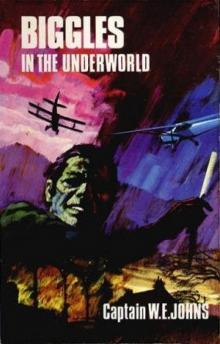 Biggles in the Underworld
Biggles in the Underworld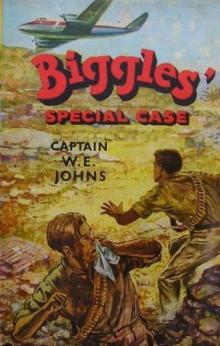 Biggles' Special Case
Biggles' Special Case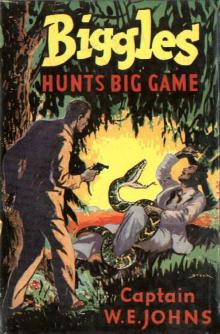 34 Biggles Hunts Big Game
34 Biggles Hunts Big Game 03 Now To The Stars
03 Now To The Stars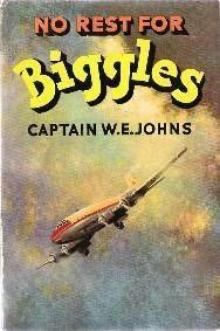 55 No Rest For Biggles
55 No Rest For Biggles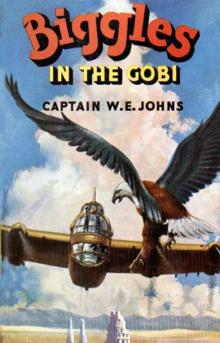 46 Biggles in the Gobi
46 Biggles in the Gobi 52 Biggles In Australia
52 Biggles In Australia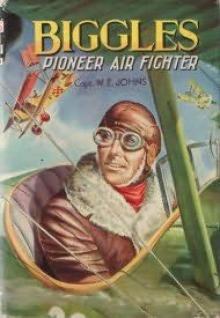 51 Biggles Pioneer Air Fighter
51 Biggles Pioneer Air Fighter 05 Biggles Flies East
05 Biggles Flies East 28 Biggles In Borneo
28 Biggles In Borneo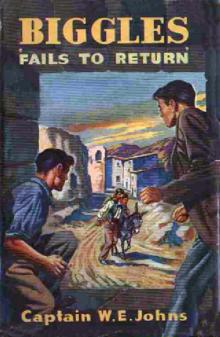 29 Biggles Fails to Return
29 Biggles Fails to Return 55 No Rest For Biggles (v2)
55 No Rest For Biggles (v2) Biggles Does Some Homework
Biggles Does Some Homework Biggles of the Camel Squadron
Biggles of the Camel Squadron 35 Biggles Takes A Holiday
35 Biggles Takes A Holiday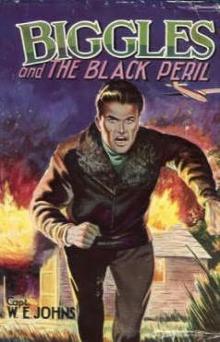 Biggles And The Black Peril (06)
Biggles And The Black Peril (06) 17 Biggles And The Rescue Flight
17 Biggles And The Rescue Flight Biggles Learns To Fly
Biggles Learns To Fly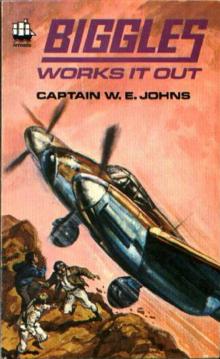 40 Biggles Works It Out
40 Biggles Works It Out 05 Biggles Learns To Fly
05 Biggles Learns To Fly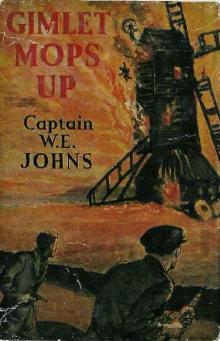 04 Gimlet Mops Up
04 Gimlet Mops Up 10 Biggles and Co
10 Biggles and Co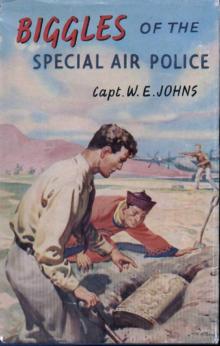 47 Biggles Of The Special Air Police
47 Biggles Of The Special Air Police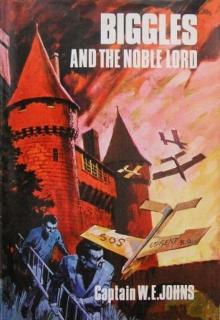 Biggles and the Noble Lord
Biggles and the Noble Lord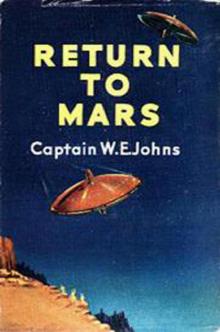 T2 Return To Mars
T2 Return To Mars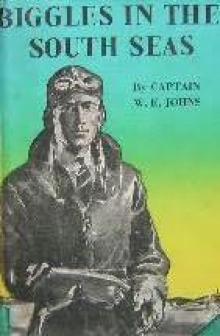 21 Biggles In the South Seas
21 Biggles In the South Seas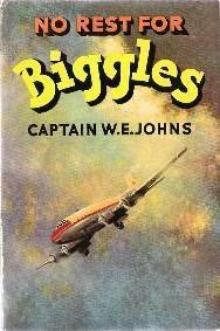 No Rest For Biggles
No Rest For Biggles Biggles In The Cruise Of The Condor (02)
Biggles In The Cruise Of The Condor (02)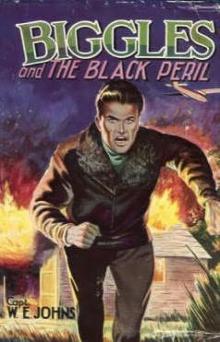 06 Biggles And The Black Peril
06 Biggles And The Black Peril Biggles and the Deep Blue Sea
Biggles and the Deep Blue Sea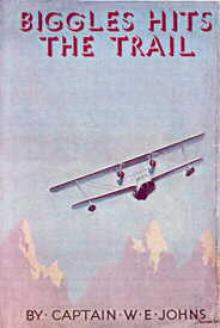 06 Biggles Hits The Trail
06 Biggles Hits The Trail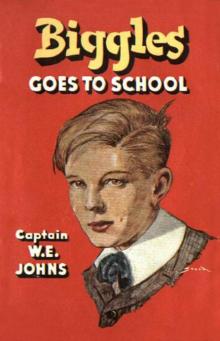 39 Biggles Goes To School
39 Biggles Goes To School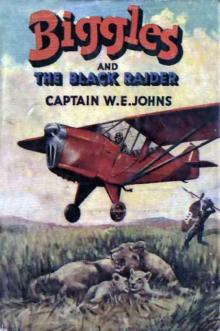 44 Biggles and the Black Raider
44 Biggles and the Black Raider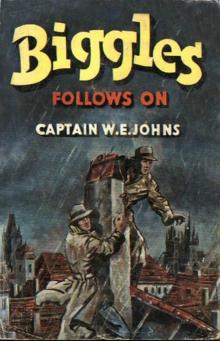 42 Biggles Follows On
42 Biggles Follows On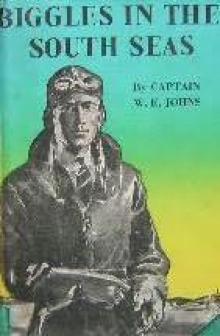 Biggles In the South Seas
Biggles In the South Seas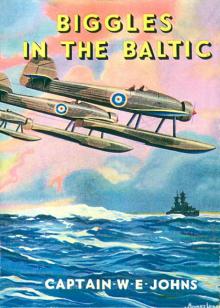 21 Biggles In The Baltic v3
21 Biggles In The Baltic v3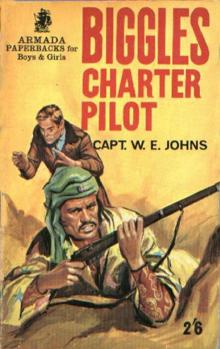 27 Biggles - Charter Pilot
27 Biggles - Charter Pilot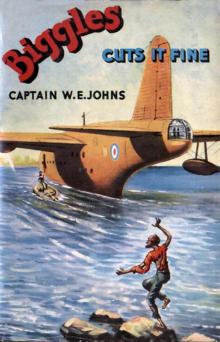 49 Biggles Cuts It Fine
49 Biggles Cuts It Fine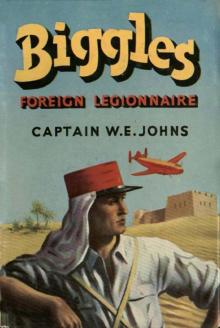 51 Biggles Foreign Legionaire
51 Biggles Foreign Legionaire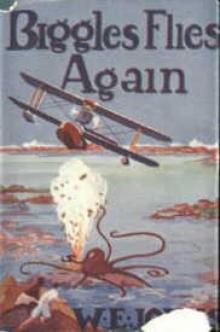 04 Biggles Flies Again
04 Biggles Flies Again 16 Biggles Flies North
16 Biggles Flies North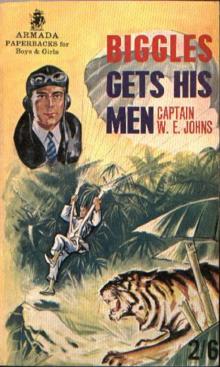 37 Biggles Gets His Men
37 Biggles Gets His Men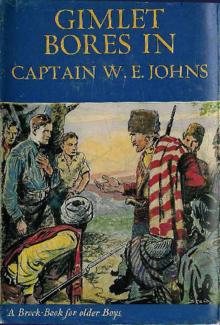 07 Gimlet Bores In
07 Gimlet Bores In 19 Biggles Secret Agent
19 Biggles Secret Agent 32 Biggles In The Orient
32 Biggles In The Orient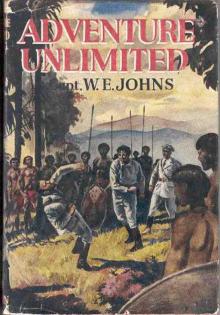 Adventure Unlimited
Adventure Unlimited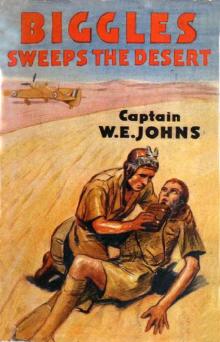 26 Biggles Sweeps The Desert
26 Biggles Sweeps The Desert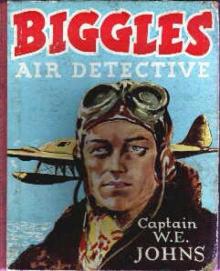 Biggles Air Detective (43)
Biggles Air Detective (43) 36 Biggles Breaks The Silence
36 Biggles Breaks The Silence 14 Biggles Goes To War
14 Biggles Goes To War 18 Biggles In Spain
18 Biggles In Spain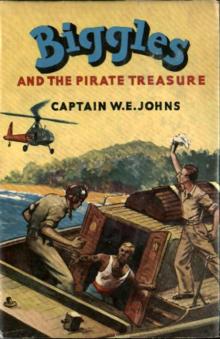 50 Biggles and the Pirate Treasure
50 Biggles and the Pirate Treasure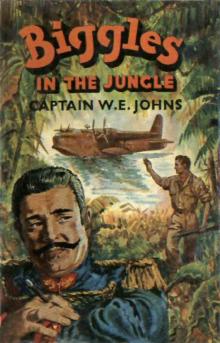 25 Biggles In The Jungle
25 Biggles In The Jungle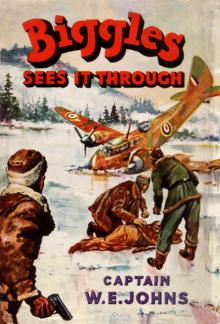 23 Biggles Sees It Through
23 Biggles Sees It Through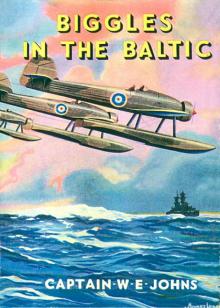 21 Biggles In The Baltic
21 Biggles In The Baltic 24 Spitfire Parade
24 Spitfire Parade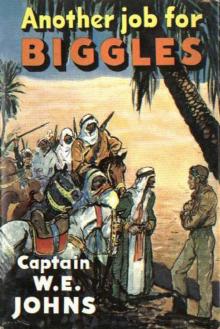 38 Another Job For Biggles
38 Another Job For Biggles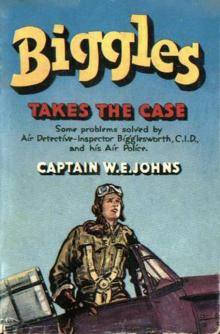 41 Biggles Takes The Case
41 Biggles Takes The Case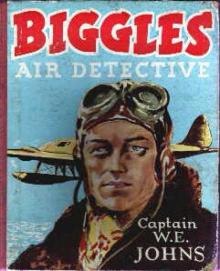 43 Biggles Air Detective
43 Biggles Air Detective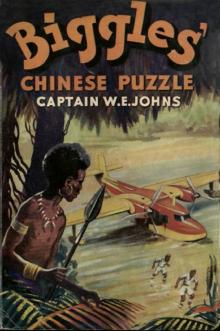 53 Biggles Chinese Puzzle
53 Biggles Chinese Puzzle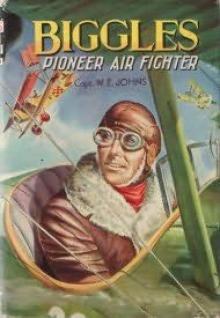 Biggles Pioneer Air Fighter (51)
Biggles Pioneer Air Fighter (51)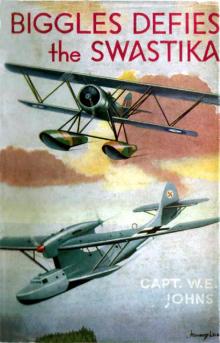 22 Biggles Defies The Swastika
22 Biggles Defies The Swastika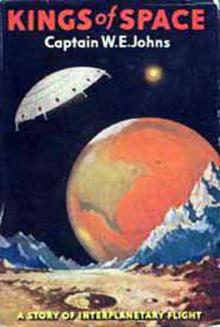 01 Kings Of Space
01 Kings Of Space